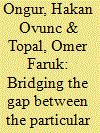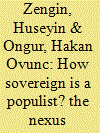|
|
|
Sort Order |
|
|
|
Items / Page
|
|
|
|
|
|
|
| Srl | Item |
| 1 |
ID:
156100


|
|
|
|
|
| Summary/Abstract |
This paper investigates whether the Turkish intellectual Cemil Meriç’s metaphor of silent yet peaceful communication among world literature classics on the same bookshelf might be employed in international political theory in contrast to traditional cosmopolitan or communitarian approaches, which favor either the particular or the universal in constructing social actors. Reviewing Meriç’s works and his conceptualizations of umran and irfan, we first inspect the underlying separation between what Meriç calls the processes of nationalism and nationalization. Meriç defines the latter as a form of people’s construction, which curiously echoes Ernesto Laclau’s definition of social articulations among conflicting particularities under a universal signifier. We then attempt to extend Meriç’s approach toward the international in order to transcend the Westphalian tradition in international relations and to reinterpret Andrew Linklater’s normative cosmopolitanism by lifting the prerequisite of dialogue among international actors for peaceful coexistence.
|
|
|
|
|
|
|
|
|
|
|
|
|
|
|
|
| 2 |
ID:
173199


|
|
|
|
|
| Summary/Abstract |
This article investigates the effects of populist discourse on leadership and state behavior at the international level. From 2002 to 2013, Turkey’s Justice and Development Party (AKP) gradually consolidated its power, largely by deploying populist discourses and actions. However, after the party faced a number of challenges, including the Gezi protests, corruption allegations, and a failed coup, its populist rhetoric did not only begin to weaken but also seems to have created a problem of path dependency, which limited the decision-making capability at the hands of its leadership. By comparing the 2001–2002 and 2018–2019 economic crises based on the most-likely case research design, we assert that the AKP’s discursive turn into anti-Western and anti-establishment politics pushed the party into a corner, making it less likely to collaborate with international organizations, such as the IMF and even private consulting companies despite the country’s high inflation rates and currency depreciation.
|
|
|
|
|
|
|
|
|
|
|
|
|
|
|
|
| 3 |
ID:
171212


|
|
|
|
|
| Summary/Abstract |
This study examines the relationship between religion and politics in current Turkish society, particularly since the Justice and Development Party (AKP) consolidated its power over state institutions and replaced the Kemalist establishment in the early 2010s. It argues that the AKP has re-instrumentalized the Presidency of Religious Affairs (Diyanet) and used its mosques to enact a performance of nationalism, deviating from a Kemalist, laicist-national identity towards a more encompassing, Ottomanist, religious one. After discussing the unique understanding of laicism in Turkey and the transformation of Diyanet as a state apparatus, content and discourse analyses are used to examine the texts of 1,200 Friday khutbas, weekly prayers that are ordinarily prepared and distributed nationwide by Diyanet. These indicate how citizens perform their nation simply by participating in gatherings, composing the congregation, listening to imams, and being exposed to the reminders of their (re-)identified nationality. The content analysis of Friday khutbas over three distinct periods—1927, 1997–2010, and 2011–2018—illustrates that, as political power shifts over time, the repetition of certain banal reminders used in the khutbas has resulted in different performances of the nation and that, under the rule of the AKP, a new performance has already begun.
|
|
|
|
|
|
|
|
|
|
|
|
|
|
|
|
|
|
|
|
|